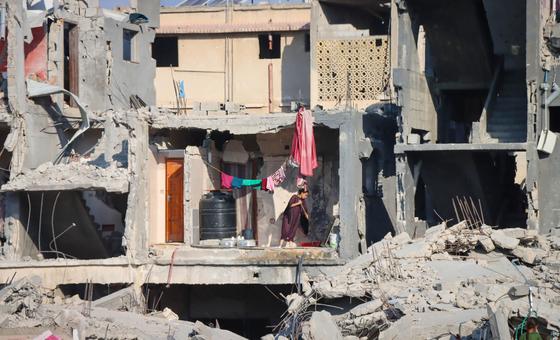The war in Gaza was sparked following a brutal attack by Hamas and other Palestinian armed groups in southern Israel and has led to an ongoing offensive by Israeli forces against the militants.
Ahmed Abu Aita lost 45 relatives, including his wife and son, together with his family-run dairy and cheese business following an airstrike on 20 October 2023.

Ahmed Abu Aita gestures towards his house in northern Gaza which has been reduced to rubble.
“The pain of losing my family, my son and my wife is indescribable,” he told Ziad Taleb, the UN News correspondent in the Gaza Strip.
“I was caught under rubble,” he said. “I was crying for help for two days but no one could hear me as this area is considered too dangerous to be in. Finally, a neighbour heard my pleas for help.”
“Some of my family members are still under the rubble,” he added.
Hamas attacks
The 7 October attacks by Hamas and other Palestinian armed groups left some 1,200 dead and more than 250 people taken hostage.
The Israeli response in Gaza has claimed the lives of over 40,000 Palestinians in the enclave, according to the Hamas-run Ministry of Health.
In addition, close to 90 per cent of the population has been displaced – many forced to move several times.
‘Death row’
Many Gazans feel as if “everyone has been put on death row” since the war began, according to senior humanitarian officer Jonanthan Whittall at the UN Office for the Coordination of Humanitarian Affairs (OCHA).
“Either they’ve been killed by bombs and bullets, or they’re being slowly suffocated by the lack of means to survive,” he said, adding that “it seems that the only distinction being made is at the speed at which you die.”

Jonathan Whittall works for OCHA in Gaza.
One year of ‘destruction, displacement and desperation’
A year of “destruction, displacement and desperation” has left all of Gaza in ruins and almost all Palestinians forced out of their own homes, pushed into just 13 per cent of the total area of the Gaza Strip, according to Mr. Whittall.
“I wish life could go back to the way it was before the war. I hope, even though it’s impossible, that my family members who were martyred will come back,” said Mr. Aita.
Mr. Aita also underscored the worsening humanitarian situation in Gaza.
“To get filtered water, we stand in lines under the sun just to fill two gallons of water. We also struggle to gather wood to light a fire,” he said, adding that he now lives with around 12 people in a small classroom.
Considering the lack of food and safe water, the insufficient shelter and the collapsed health system, Mr. Whittall lamented that OCHA is obstructed from delivering humanitarian assistance “every single day”.
Hope to return to the ‘old and ordinary’
Despite all the destruction and loss of life, Mr. Aita’s resilience remains.
“We won’t give up no matter what the occupation imposes on us and destroys, we’ll rebuild. God willing, we’ll come back stronger,” he remarked.
He plans to reopen the business and keep his father’s name alive.

